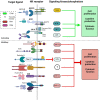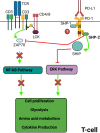Natural killer cells in liver transplantation: Can we harness the power of the immune checkpoint to promote tolerance?
- PMID: 34866338
- PMCID: PMC9099129
- DOI: 10.1111/cts.13208
Natural killer cells in liver transplantation: Can we harness the power of the immune checkpoint to promote tolerance?
Abstract
The roles that natural killer (NK) cells play in liver disease and transplantation remain ill-defined. Reports on the matter are often contradictory, and the mechanisms elucidated are complex and dependent on the context of the model tested. Moreover, NK cell attributes, such as receptor protein expression and function differ among species, make study of primate or rodent transplant models challenging. Recent insights into NK function and NK-mediated therapy in the context of cancer therapy may prove applicable to transplantation. Of specific interest are immune checkpoint molecules and the mechanisms by which they modulate NK cells in the tumor micro-environment. In this review, we summarize NK cell populations in the peripheral blood and liver, and we explore the data regarding the expression and function of immune checkpoint molecules on NK cells. We also hypothesize about the roles they could play in liver transplantation and discuss how they might be harnessed therapeutically in transplant sciences.
© 2021 The Authors. Clinical and Translational Science published by Wiley Periodicals LLC on behalf of American Society for Clinical Pharmacology and Therapeutics.
Conflict of interest statement
The authors declared no competing interests for this work.
Figures



Similar articles
-
Innate Immune Cells in Immune Tolerance After Liver Transplantation.Front Immunol. 2018 Nov 9;9:2401. doi: 10.3389/fimmu.2018.02401. eCollection 2018. Front Immunol. 2018. PMID: 30473690 Free PMC article. Review.
-
Targeting NK Cell Checkpoint Receptors or Molecules for Cancer Immunotherapy.Front Immunol. 2020 Jun 23;11:1295. doi: 10.3389/fimmu.2020.01295. eCollection 2020. Front Immunol. 2020. PMID: 32714324 Free PMC article. Review.
-
Natural Killer Cells: The Linchpin for Successful Cancer Immunotherapy.Front Immunol. 2021 Apr 28;12:679117. doi: 10.3389/fimmu.2021.679117. eCollection 2021. Front Immunol. 2021. PMID: 33995422 Free PMC article. Review.
-
NK Cell Dysfunction and Checkpoint Immunotherapy.Front Immunol. 2019 Aug 21;10:1999. doi: 10.3389/fimmu.2019.01999. eCollection 2019. Front Immunol. 2019. PMID: 31552017 Free PMC article. Review.
-
Targeting Checkpoint Receptors and Molecules for Therapeutic Modulation of Natural Killer Cells.Front Immunol. 2018 Sep 10;9:2041. doi: 10.3389/fimmu.2018.02041. eCollection 2018. Front Immunol. 2018. PMID: 30250471 Free PMC article. Review.
Cited by
-
Mechanisms of Tolerance Induction in Liver Transplantation: Lessons Learned from Fetomaternal Tolerance, Autoimmunity and Tumor Immunity.Int J Mol Sci. 2024 Aug 28;25(17):9331. doi: 10.3390/ijms25179331. Int J Mol Sci. 2024. PMID: 39273280 Free PMC article. Review.
-
Recombinant Human Interleukin-2 Corrects NK Cell Phenotype and Functional Activity in Patients with Post-COVID Syndrome.Pharmaceuticals (Basel). 2023 Apr 3;16(4):537. doi: 10.3390/ph16040537. Pharmaceuticals (Basel). 2023. PMID: 37111294 Free PMC article.
-
Understanding Liver Transplantation Outcomes Through the Lens of Its Tissue-resident Immunobiome.Transplantation. 2025 Jul 1;109(7):e349-e361. doi: 10.1097/TP.0000000000005303. Epub 2025 Jan 9. Transplantation. 2025. PMID: 39780303 Review.
-
Overcoming the challenges in translational development of natural killer cell therapeutics: An opinion paper.Front Oncol. 2022 Dec 2;12:1062765. doi: 10.3389/fonc.2022.1062765. eCollection 2022. Front Oncol. 2022. PMID: 36531041 Free PMC article. No abstract available.
-
Donor liver natural killer cells ameliorate liver allograft rejection via inducing apoptosis of alloreactive CD8+ T cells generating CD4+CD25+ regulatory T cells.Sci Rep. 2025 Jul 2;15(1):23499. doi: 10.1038/s41598-025-06456-1. Sci Rep. 2025. PMID: 40604024 Free PMC article.
References
-
- Kondo M, Akashi K, Domen J, Sugamura K, Weissman IL. Bcl‐2 rescues T lymphopoiesis, but not B or NK cell development, in common gamma chain‐deficient mice. Immunity. 1997;7(1):155‐162. - PubMed
-
- Rosenau W, Moon HD. Lysis of homologous cells by sensitized lymphocytes in tissue culture. J Natl Cancer Inst. 1961;27:471‐483. - PubMed
Publication types
MeSH terms
Substances
Grants and funding
LinkOut - more resources
Full Text Sources
Medical

